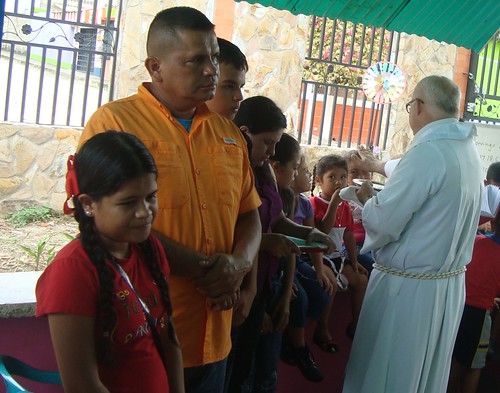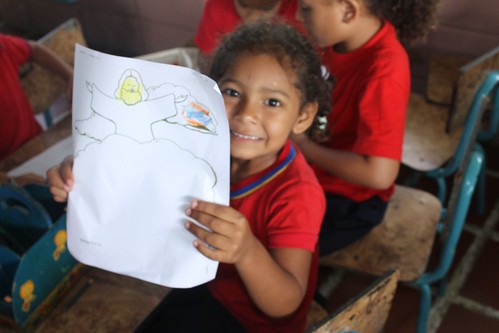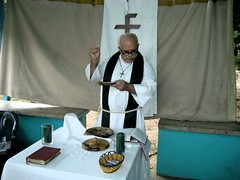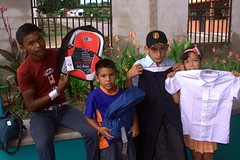On
Trinity Sunday, May 30, 2021, Omar
Martinez and I
represented the Lutheran Church of Venezuela in a graduation ceremony
via Zoom
videoconferencing
with six other seminary students from Mexico, Guatemala, Bolivia,
Peru and Spain.
The other seminarians had completed their coursework while in residence at Concordia Seminary El Reformador in Palmar Arriba, the Dominican Republic, in preparation for ordination. Because the ceremony was postponed from last year, some of them were ordained and installed as pastors before the “virtual” graduation. For example, Elvis Carrera has been serving as the pastor of the congregation in Lima, Peru, where Luz Maria’s daughter, Yepci, and her family attend.
Omar,
who is pastor of Cordero de Dios (Lamb of God) and I were both
ordained years ago. We
pursued our continuing
education
an on-line program,
Formación Pastoral Hispanoamérica (FPH), offered by the Dominican
seminary in cooperation with Concordia
Theological Seminary, Fort Wayne, Indiana. It was a milestone for
Omar and me, and also for the concept of distance learning.
FPH is an international extension of the Fort Wayne seminary’s Specific Ministry Pastor–Español/English program. This program follows the basic structure, guidelines and restrictions of the regular SMP program as a means to provide ordained men to serve in mission situations where a candidate with traditional residential seminary training is not available or cannot be supported, but it is focused on preparing Spanish speakers for Word and Sacrament ministry.
By divine order, there is one office of the public ministry and, according to Article XIV of the Augsburg Confession, “no one should publicly teach in the Church or administer the Sacraments unless he be regularly called (rite vocatus)”. But the Scriptures do not specify any particular mode, pattern, or length of pastoral preparation. What makes someone a pastor is examination and certification, then call and ordination, in an orderly process.
“For those who serve well as deacons gain a good standing for themselves and also great confidence in the faith that is in Christ Jesus.” 1 Timothy 3:13. In the New Testament church, pastors were recruited from the ranks of deacons, who were laymen entrusted with the work of the church apart from preaching and administration of the sacraments. As we read in Acts, Philip, one of the original deacons (Acts 6:5) was later sent to preach and baptize in Samaria (Acts 8).
“This is why I left you in Crete, so that you might put what remained into order, and appoint elders in every town as I directed you.” Titus 1:5
The word translated “elder” is πρεσβύτερος (presbuteros), which is the root of the English word, “priest”. It is used interchangeably in the New Testament with ποιμήν (poimén or pastor) and ἐπίσκοπος (episkopos or bishop), all referring to the one office of the public ministry. As Luther writes in his “Treatise on the Power and Primacy of the Pope”: “60. The Gospel assigns to those who preside over churches the command to teach the Gospel to remit sins, to administer the Sacraments and besides jurisdiction, namely, the command to excommunicate those whose crimes are known, and again to absolve those who repent. 61 And by the confession of all, even of the adversaries, it is clear that this power by divine right is common to all who preside over churches, whether they are called pastors, or elders, or bishops.”
Paul had visited the island of Crete after his first Roman imprisonment, and, together with Titus, extended the preaching of the Gospel throughout its length and breadth. When Paul’s presence was demanded elsewhere, he left Titus behind as his representative, to see that a decent order of worship and of conducting the business of the congregations be introduced everywhere. This included, among others, that all the congregations should choose pastors under his direction and with his help.
The New Testament model of raising up local elders, already proven for spiritual maturity and leadership (1 Timothy 3) , is actually much closer to today’s non-residential programs than the sending of potential candidates off to a centralized location for pastoral formation and academic education. The value of a residential seminary program, of course, in consistent doctrinal training for all pastoral candidates and formation of character as well as intellectual growth under the almost daily observation of experienced instructors.
But the costs and other requirements of residential seminary education long have been an obstacle to church planting in Latin America, where many families do not have the resources to send young men away from home for four years, especially if the seminary is located in a distant country. Even before the Internet became available to the public, Presbyterian missionaries to Guatemala in the 1960s developed the concept of theological education by extension (TEE). Under this model, theological educators travelled to regional centers where they provided intensive instructions for men already recognized for their leadership qualities within local communities. In between visits, students were provided with structured self-study materials. The goal was to work toward ordination without the need for abandoning jobs and families. This approach was widely adopted in the 1970s by missionaries in Latin American countries where the establishment of seminaries proved difficult.
In Venezuela during this decade, Lutheran Church – Missouri Synod missionaries organized the Juan de Frias Theological Institute to proved guided instruction not only for pastoral candidates, but also lay leaders and continuing education for ordained pastors. It was training through the Juan de Frias Theological Institute that led to my ordination by the Lutheran Church of Venezuela in 2008.
I had signed up for two years in Venezuela as a LCMS World
Missions volunteer missionary in 2002. When I married Luz Maria, I
came to share her vision of a church and school in La Caramuca. I
began taking Juan de Frias courses with the aim of improving my
ability to teach Bible classes in Spanish. More and more of the young
people attending our weekday and Sunday evangelistic activities at
the mission began asking if they could be baptized and receive the
Lord’s Supper, yet there was no national pastor who was willing to
serve our rural mission on a regular basis.
So I took advantage of an invitation in 2006 to participate in the Juan de Frias Institute’s renewed campaign to ordain more pastors. This involved setting up a kind of “mini-seminary” in Caracas where students who had already been studying for the ministry lived together in a house and dedicated their time to prayer, Bible study and classes, followed by a year of vicarage before ordination. I was part of this in 2007, except that I went home on the weekends. This meant a six- to seven-hour bus ride back to La Caramuca on Friday night, and ride to Caracas on Sunday night. But it was a great time. We had visiting professors from Concordia Seminary, St. Louis; Concordia Theological Seminary, Fort Wayne; and Concordia Seminary of Buenos Aires, Argentina, the world’s largest Spanish-speaking seminary. After a year of vicarage in La Caramuca in 2008, I was ordained at El Salvador Lutheran Church in Caracas, along with two Venezuelans, Sergio Maita and Eduardo Flores.
But opportunities for the continuing education so necessary for a pastor soon became few and far between. Travel within, as well as to and from, Venezuela became more uncertain and risky. Little by little, there were no more weekly, or even monthly trips to Caracas; no traveling Juan de Frias Institute workshops; and no visiting professors. And this was before COVID-19.
Concordia El Reformador Seminary was established as a regional center for residential and distance learning for people in Mexico, Central America, the Caribbean islands and South America. Its first students graduated on May 24, 2019. At the same time, more than 30 men in 12 Latin American countries continue their theological education on-line through the FPH program. That fact that this year’s graduation ceremony done by videoconference because of the pandemic shows that distance learning plays a more important role than ever.
Even more videoconferencing
The week before the virtual graduation, Luz Maria and I participated in a virtual symposium on “Life and sexuality: pastoral care and the public voice of the church”, hosted by Concordia Seminary El Reformador.
-
May 25: Pastoral Care in Cases of Sexual Sin (Rev. David Warner, former LCMS missionary to Spain and now pastor of two congregations near Custer, South Dakota).
-
May 26: Sexuality and Society from a Biblical Perspective (Rev. Dr. David Preus, professor at Concordia Seminary El Reformador)
-
May 27: The public voice of the Church on sexuality, life and death (Rev. Dr. Clóvis Jair Prunzel, professor at Concordia Seminary, São Leopoldo, Brazil). - May 28: What is life and death, from the perspective of the Word of God and the Catechism of Martin Luther (Rev. Dr. John Pless, professor at Concordia Theological Seminary, Fort Wayne, Indiana).
We participated on May 10 to 19 in an online workshop on
confessional biblical interpretation with the Rev. Dr. Roberto
Bustamante of Concordia Seminary El Reformador, Brian Gauthier from
Concordia University
of Nebraska, Pastor Roberto Weber from the Evangelical Lutheran
Church of Argentina and 60 pastors and seminarians from all over
Latin America.
On Thursday, May 13, and Friday, May 14, we participated in the LeadaChild Symposium 2021 by Zoom videoconference. LeadaChild is a Lutheran mission agency dedicated to sharing the gospel of Jesus Christ to children through Christian education in five regions of the world, Guatemala, Central America and Haiti, South America, West Africa and Asia, and also supports an after school program. in Bethlehem. LeadaChild's method is to provide scholarships, school enrollment, and supplies for children so that they can attend Lutheran schools and after-school programs. Also to provide professional development for leaders and teachers, with an emphasis on effective ways to share the gospel and teach Bible truths to children. LeadaChild began supporting educational projects in Venezuela in 1991 and has supported our mission since 2006. The theme of the symposium was changes in education around the world due to COVID-19. We reviewed new software and strategies for online Christian education.
And, every week, Luz Maria mentors 40 women enrolled in the deaconess training coordinated by Danelle Putnam of Concordia Seminary El Reformador and Eliezer Mendoza, director of the Juan de Frias Theological Institute.
COVID-19 claims a life in our community
We received word that Global Lutheran Outreach and the Confessional Lutheran Church of Chile are planning another shipment of non-prescription medicines to Venezuela. We give thanks to God for this. Pray for us as the COVID-19 virus has arrived in La Caramuca and adds to the health risks that already threaten our people. This past week COVID-19 claimed the live of Rafael Méndez, a prominent member of the community and proprietor of a general store and butcher shop near the town plaza. We remembered his family in prayer on Sunday and also others among us that suffer from the virus.
“You will not fear the terror of the night,nor the arrow that flies by day, nor the pestilence that stalks in darkness, nor the destruction that wastes at noonday.” Psalm 91:5-6
Almighty God, Who forgives all our iniquities and heals all our diseases, Who has proclaimed Your name to be the Lord that heals us and has sent Your well-beloved Son to bear our sicknesses, look in mercy upon Your servants, pardon and forgive us our transgressions, and of Your lovingkindness remove the plague with which You have visited us. This we ask according to Your will, through Jesus Christ, our Lord. Amen.























